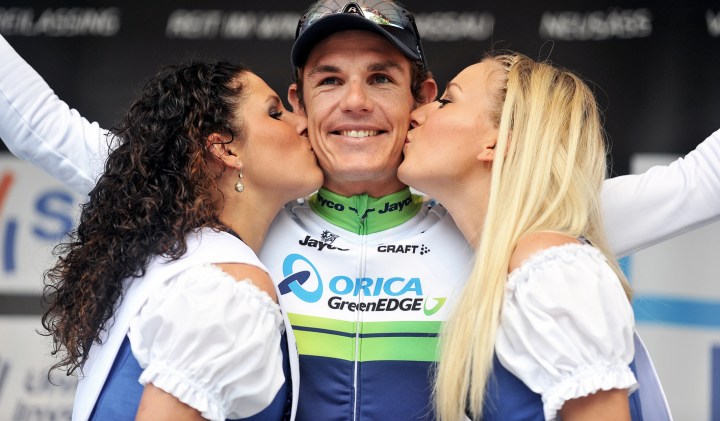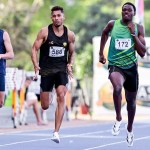Sport
GroundUp: After Daryl Impey’s exoneration, truth could be the ultimate victim

Daryl Impey’s quick exoneration on doping charges brought relief to many cycling fans. But, ponders SHUAIB MANJRA for GROUNDUP, there may be much more to this story.
With South Africa desperately in need of sporting heroes, Darel Impey was a consistent performer in an unforgiving sport where a few seconds divide those bathed in glory and those whose names history will not record.
Impey’s legacy, as the first African to wear the famed yellow jersey in last year’s Tour de France, will be imprinted in history, bringing glory to himself and his country.
Sadly his opportunity to improve on that feat, or at least repeat it in this year’s Tour, was lost because of his adverse analytical finding, or what in common parlance is called a ‘positive test’.
Impey tested positive for probenecid, a substance on the Prohibited List in sport, just before this year’s Tour de France, where he was to ride for team Orica Greenedge.
Probenecid is not performance enhancing, but is prohibited in sport because it is considered a masking agent – where it could potentially mask the presence of other performance enhancing substances such as anabolic steroids or erythropoietin.
While probenecid has been described as a diuretic, it actually is a ‘uricosuric’ drug that increases the urinary excretion of uric acid, which causes gout. But probenecid’s masking properties are assumed because of another property that it possesses: it acts to reduce the renal excretion of some drugs by competing for receptors in the kidney. So less of the active drug would be excreted in the kidney, thereby increasing its concentration in the plasma. This would have dual benefits for those using certain performance enhancing drugs: it would increase the plasma concentration of the drug, enhancing its effects, and at the same time reduce its excretion in the urine, thereby avoiding detection in urine base doping control tests.
In the clinical context, probenecid can increase the blood concentration of some antibiotics, antivirals and non-steroidal anti-inflammatory drugs in order to reduce the required dosage of such drugs. This proved particularly useful during World War II, when there was a dire shortage of penicillin, which was rapidly excreted via the kidneys, thereby reducing its active life in the plasma. In fact, so dire was the need to save the lives of injured soldiers that the urine of those using penicillin was collected to isolate the drug and reuse it. Probenecid proved critical in prolonging the effect of penicillin by reducing renal excretion.
Probenecid is rarely used today because of the abundance of synthetically produced penicillin and the availability of superior drugs to treat gout.
So the case against Impey was predicated on the belief that he had used the drug to mask a prohibited substance.
The procedure in the case of a positive test is that Impey would be given the right to have his B sample tested – which is split from the ‘A’ sample at collection. Should this confirm the positive test, then Impey either accepts the charge and sanction attendant to committing an Anti-Doping Rule Violation or appears before an independent tribunal to plead his defence. He would have the right to full legal and expert representation, which is the path he chose.
Impey’s defence was simple – that he was the victim of contamination, which is not an unusual defence. In fact it is the predominant defence now used by athletes who test positive, in order to invoke the escape clause provided in the World Anti-Doping Code, which is ‘no fault’ or ‘no significant fault’ thereby avoiding sanction or receiving a reduced sanction respectively. Essentially this means that the athlete tested positive through no fault of their own.
Tour de France winner, Alberto Contador, claimed in his defence that the anabolic steroid clenbuterol found in his urine was a contaminant from meat that he had consumed. His defence was rejected and he was given a two-year suspension.
Frank Schleck, who came third behind his brother Andy in the 2011 Tour de France, claimed that the diuretic xipamide found in his urine was due to a contaminated product that he had consumed. His sanction was reduced by half because of the ‘no-significant fault’ clause and consequently he only served a one-year ban.
Impey’s defence was, however, novel – he claimed that he tested positive because the empty gelatin capsule that he purchased from a pharmacy was contaminated by probenecid, which the pharmacist had dispensed to a patient two hours prior to Impey. Both products were dispensed using the same pill-counter, as confirmed in evidence by the pharmacist.
This is highly unusual for a number of reasons:
- Probenecid is a rarely used drug nowadays; in fact few pharmacies even stock it. Furthermore, for contamination to occur an uncoated version of the drug must be used in order to produce residue, or the drug must be cut or crushed. This is also rare.
- What are the chances of Impey being the person who attends the pharmacy after the patient who was dispensed the rarely-used probenecid, in a rare uncoated form? So the first issue is that all these factors had to line up against Impey.
- Furthermore it seems that the South African Institute for Drug-Free Sport (SAIDS) had his ‘A’ sample retested – which again is highly unusual.
Procedurally confidence in the laboratory results allows an agency to accept the results of the ‘A’ sample and upon request by the athlete have the ‘B’ sample tested. ‘A’ samples are only retested should additional tests be required such as in the case of a testosterone: epi-testosterone ratio where the sample is sent to a laboratory in Cologne, Germany.
Retesting the ‘A’ sample possibly showed doubt by SAIDS in the result, the initial laboratory procedure or they wanted to be doubly sure because of the high profile nature of this case. Regardless, it did cause a significant delay in this case being brought before a tribunal. This additional test on the ‘A’ sample is unusual.
This raises another question: probenecid as a masking agent does not completely block the presence of the active drug in the urine specimen. With currently available sophisticated tests it is highly unlikely that residues of the active drug cannot be identified in urine concomitantly with the masking agent – thereby proving the case of doping rather than simply relying on evidence of the presence of the masking agent. SAIDS could have directed the retesting of the ‘A’ sample on attempting to detect a performance enhancing substance rather than a simple confirmation of the presence of probenecid.
Most intriguing, however, is the suggestion being made by some that SAIDS had accepted Impey’s defence without a challenge before a tribunal. When a case is brought before a tribunal the prosecution and defence present their case, including leading evidence and cross-examining all material witnesses, including scientific experts. The tribunal, consisting of legal and scientific experts, eventually adjudicates the claims based on a balance of probabilities, as in a civil case, and makes a determination. In Impey’s case there was none of this, since SAIDS accepted Impey’s defence without allowing the tribunal to hear argument.
This again is highly unusual.
So why did SAIDS capitulate on this case so easily, or so it seems? The first is that the defence was so overwhelmingly convincing that the prosecution felt they had no case. Alternatively, they felt that the chances of convincing the tribunal seemed remote, and rather than go through a lengthy and costly process, SAIDS would rather, in a sense, accept the defence and be done with the case. The counter argument would be: rather than SAIDS making the decision not to challenge the defence, why not leave it up to an expert, independent tribunal to make a reasoned decision after all the evidence is presented before them. This would seem more objective and fair.
The alternative scenario is a more disconcerting one, with some evidence to support it – including the retesting of the ‘A’ sample. This scenario is that there were serious procedural flaws in SAIDS case, which they did not want to expose at a tribunal, particularly if Impey had world-class experts defending his case. These could be procedural flaws in the laboratory testing process – which has allowed athletes such as Gert Thuys to be exonerated. Alternately it could be related to the significant delay in this case costing Impey dearly since he missed the Tour de France and the Vuelta.
Other procedural flaws could relate to the doping control process, where the Doping Control Officers may not have strictly complied with the International Standard for Testing, bringing into doubt the validity of the results. (Comrades marathon winner Ludwick Mamabolo walked free after a tribunal found fourteen irregularities in the doping control process.)
If such procedural flaws were exposed in Impey’s case it would be rather embarrassing to SAIDS, who already have suffered reputational damage in the case of Mamabolo. This fear would have forced SAIDS into a cynical calculus – either expose the institute to further reputational damage or allow an athlete to walk free, without a formal tribunal which potentially could have publicly exposed such flaws in SAIDS processes.
Of course the athlete could have potentially walked free anyway if the process were seriously flawed. This conjecture may never be proven since although the Union Cycliste Internationale and the World Anti-Doping Agency have a right to appeal, they are unlikely to do so with a seriously flawed process. Alternately, it may play out in the courts, should Impey wish to sue SAIDS for loss of earnings and damage to his personal and professional reputation. This would be a great risk to SAIDS’s future credibility. DM
Manjra is a physician with extensive anti-doping experience.
This feature was first published on www.groundup.org.za
Photo: A handout picture provided by the Bayern-Rundfahrt shows South African Daryl Impey of Orica GreenEdge team celebrating on the podium after winning the third stage of the Bavarian cycling tour 2014 in Neusaess, Germany, 30 May 2014. EPA/Mario Stiehl / Bayern-Rundfahrt.




















 Become an Insider
Become an Insider